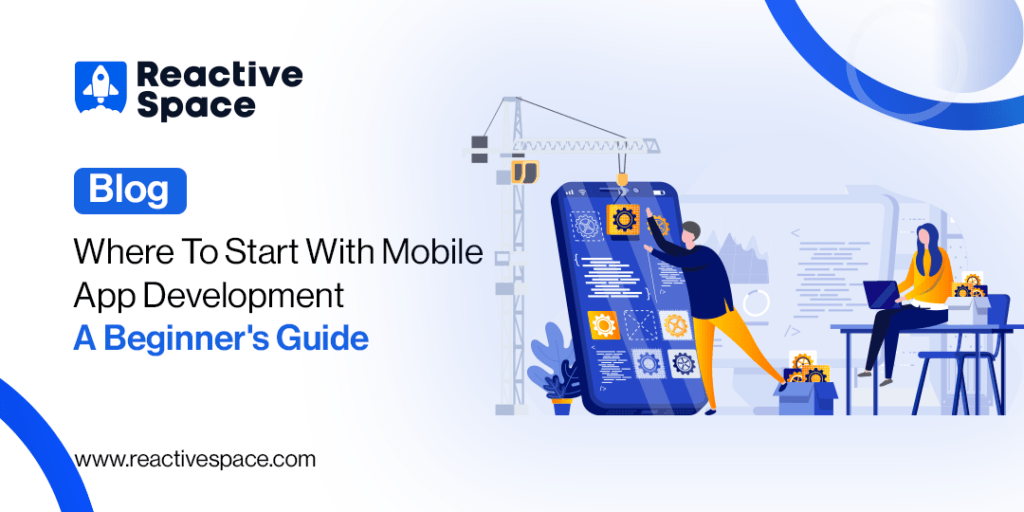
Embarking on the thrilling journey of mobile app development marks an exciting endeavor, yet it can be a maze of complexities for beginners. Whether you’re a budding developer stepping into the coding realm, an entrepreneur envisioning the next big app, or a business owner contemplating the utilization of mobile app development services, this guide is meticulously crafted to be a beacon of clarity, engagement, and invaluable insights tailored for a diverse audience. Our overarching goal extends beyond merely demystifying the intricate process of app creation; it is to empower you with the knowledge necessary for making informed decisions as you navigate through the captivating and dynamic world of mobile application development.
For aspiring developers, the initial foray into mobile app development services might seem difficult, filled with unfamiliar coding languages and intricate frameworks. This guide is your compass, providing a roadmap that not only simplifies but also illuminates the path ahead. Entrepreneurs with a vision for the next groundbreaking app and those who wants to build their own app will find practical insights into translating ideas into tangible, user-friendly applications. Business owners contemplating the integration of mobile apps into their operations can expect valuable guidance on selecting the right mobile app development services to align with their goals.
It’s all a puzzle that this guide systematically unravels. By breaking down complex concepts into digestible portions, we aim to bridge the knowledge gap and empower every reader, regardless of their background or experience. The goal is to foster an environment where the intricacies of coding, designing, and deploying an app become not only comprehensible but also exciting which might guide you to be top-notch mobile app development company.
Understanding the Basics of Mobile App Development
To get started with mobile app development, it’s crucial to understand the basics. Begin by getting familiar with programming languages like Java, Swift, or Kotlin, depending on whether you want to create apps for Android or iOS. These languages are like the building blocks of Building your own app development. If you’re aiming for Android, Java is widely used, while Swift and Kotlin are preferred for iOS. Knowing these languages is essential because they provide the essential skills you need to develop your app.
Think of it as learning the language that computers understand to make your app work. Java is like a Swiss Army knife for Android apps, providing a lot of functionality. Swift and Kotlin offer a more modern approach for iOS. You can find beginner-friendly resources online, like Codecademy or Udacity, to help you grasp these concepts. Learning these foundational elements is like opening a door to the world of creating your own mobile apps, making your journey into app development both accessible and rewarding.
How do I start learning mobile app development?
Starting your journey to learn about mobile app development is easy and can be done through different ways. Online courses, coding bootcamps, and interactive tutorials are great places to begin. Websites like Codecademy, Udacity, and freeCodeCamp offer structured courses designed for beginners.
These platforms act as virtual classrooms where you can start from scratch and gradually build up your knowledge. Online courses provide step-by-step lessons, coding bootcamps offer immersive experiences to learn intensively, and interactive tutorials make the learning process engaging and fun. These resources cater to beginners, making it easy for you to understand even if you have no prior experience. These above-mentioned channels offer a variety of learning methods, estimated cost and all the skills required to develop an app, ensuring that you find a style that suits you as you embark on your exciting journey into the world of mobile app development.
The First Steps in App Development
When you start creating an app, the beginning is really important. One key thing is to have a clear idea of what your app is supposed to do. Defining the purpose of your app is like setting the foundation for a strong building and it’s crucial for the success of your project.
Identifying who you’re making the app for is just as important. Think about your target audience ,the people you want to use your app. To understand what they need and expect, you’ll need to do some research about the market.
Now, there’s another important choice to make: whether to build your app specifically for one type of phone (like Android or iPhone) or for both. This decision, known as native or cross-platform development, is a big deal because it affects how many people can use your app and what it can do. This choice shapes the whole direction of your project, so it’s something to think about carefully.
What is the first step in app development?
When you start making your app, the first step is like drawing a map. You need to figure out what your app is supposed to do,its purpose. Think about who you want to use your app; that’s your target audience. Then comes the important part of the research. You need to learn about the market, which is like understanding what’s popular or needed. Doing this helps you build a strong base for your app, like laying down a solid foundation for a house. So, before you dive into creating, take the time to define your app’s purpose, know who it’s for, and explore what’s going on in the world of apps. This groundwork sets the tone for a successful app development journey.
Navigating the 7 Steps to Creating an App
Building a mobile app is like putting together a puzzle with seven important pieces: ideation, design, development, testing, deployment, promotion, and maintenance. First, you brainstorm ideas, much like deciding what kind of story the puzzle will tell. Then, you create a design, planning how the pieces fit together, just like arranging the puzzle pieces to form a complete picture. Writing the code is the development stage, bringing your puzzle to life. Testing ensures that all the pieces fit snugly, like making sure your puzzle is complete and works smoothly. Deployment is like sharing your finished puzzle with the world. Promotion is telling everyone about your puzzle, and maintenance is like keeping your puzzle in good shape, so people continue to enjoy it. Each step is crucial, and together they make sure your mobile app is not just a puzzle but a success in the digital world.
What are the 7 steps to creating an app?
1. Ideation: Brainstorm and refine your app idea.
2. Design: Create wireframes and design the user interface.
3. Development: Write the code and build the app.
4. Testing: Thoroughly test your app for functionality and usability.
5. Deployment: Release your app to the respective app stores.
6. Promotion: Market your app to increase visibility and downloads.
7. Maintenance: Regularly update and improve your app based on user feedback.
Choosing the Right Mobile App Development Services
Choosing the perfect mobile app development company and making this decision, think about their expertise, which is like knowing if they’ve played similar games before. Check out their portfolio, a bit like reviewing past match performances, to see the kind of projects they’ve handled. Client testimonials are like listening to what fans say about the team – it gives you an idea of how satisfied previous clients have been.
Equally important is understanding the cost to develop your app because you want the best quality, but it needs to fit within your budget. Knowing the costs ensures you get the service you need without breaking the bank.
If your app needs to work on different types of phones (cross-platform app development), make sure the company has experience with that. It’s like making sure your sports team can play well on different types of fields. So, take your time, consider these factors, and choose the company that fits your app development goals like a winning sports team.
Mobile app development company
Choosing a reputable mobile app development company is crucial for the success of your project. Look for expertise, experience, and a track record of successful projects.
Cost to develop an app
Understanding the cost to develop an app is a vital aspect of your planning. Factors like complexity, features, and the development team’s rates influence this cost. Striking a balance between quality and budget is key.
Monetize Your Mobile App and Effective Promotion Strategies
Once your app is developed, focus shifts to monetization strategies that align with your business goals. Options such as in-app purchases, ads, or subscription models should be considered based on your target audience. Concurrently, employ effective promotion strategies, leveraging social media and other channels to increase visibility and downloads.
Monetize Your Mobile App
Explore various monetization strategies, such as in-app purchases, ads, or subscription models, to generate revenue and ensure the sustainability of your app.
Promote Your Mobile App on Social Media and Other Channels
Craft a compelling marketing strategy to promote your app on social media and other channels. Engage with your audience, create awareness, and drive downloads. Platforms like Instagram, Twitter, and LinkedIn can be powerful tools in your promotional toolkit.
Final Words
In conclusion, venturing into mobile app development is a journey filled with learning, creativity, and strategic decision-making. By understanding the fundamental concepts, navigating the development process, and making informed decisions about mobile app development services, you position yourself for success in the dynamic world of app creation. Remember, it’s not just about building an app – it’s about creating an experience that resonates with your audience. As you embark on this exciting adventure, stay curious, stay innovative, and watch your ideas transform into digital reality.



